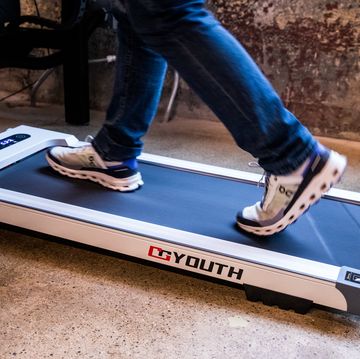There's a new study in the Journal of the American College of Cardiology, from a multi-institution group led by Duck-chul Lee at Iowa State, that's making the rounds today. The main message, as the accompanying press release puts it: "Running 5 minutes daily can reduce risk of cardiovascular disease-related death." This message -- that even relatively small doses of running can have big health implications -- is a welcome and important one. But there's another reason I find the study very interesting: , the data in this study is the exact same data that was presented in abstract (i.e. non-peer-reviewed) form at a conference two years ago, at which time it was seen as smoking-gun evidence that running more than about 20 miles a week would actually negate any health benefits associated with running. That spin is now gone -- so what happened?
When the data was first presented two years ago, I pointed out what I considered to be serious errors in their statistical analysis. Specifically, they adjusted the results to "equalize" factors like BMI, blood pressure, and cholesterol among groups running different amounts. This is misleading, because we shouldn't expect that these factors will be equal between people who run lots and people who don't run -- in fact, we expect running to have health benefits precisely because it improves BMI, blood pressure, and cholesterol, so artificially "equalizing" these factors is seriously misleading. (I have a much more detailed explanation of why this is a problem in this blog entry from a few months ago.)
Not everyone agreed, of course -- there were plenty of comments along the lines of this one:
"Yeah - science, screw that said every creationist, global warming denialist, flat earther.....and now Hutchinson....good company you keep. The science is indisputable - beyond all doubt, instead of fighting it and looking like an idiot, take it on board and adapt, instead of spreading the same old anti-science agenda that anti-vaccinators do - shocking display of ignorance."
So I can't help feeling a bit vindicated now that the full data has been published in peer-reviewed form, and all traces of the statistical adjustment I objected to have disappeared. Why? I can only assume that it didn't get past peer review, which is also presumably why it took two years for the results to be published. How much difference does it actually make? Here, for example, is a before-and-after comparison of the data on running speed:
The graph shows relative risk of dying during the study period, as presented in the abstract (red) and the peer-reviewed paper (blue), as a function of self-reported running speed, compared to non-runners. (The actual running speeds for the red data points are <6, 6-7, 7-8, and >8 miles per hour, and for the blue data points <6, 6-6.6, 6.7-7.0, 7.1-7.5, >7.6 miles per hour. With my rudimentary Excel skills, I decided not to spend all morning trying to graph that more precisely!) The key point: with incorrect statistical adjustment, there's a big rise in risk for the faster runners, such that they're pretty much as likely to die as non-runners. With the actual data, this phantom increase in risk disappears. That's exactly why the original presentation of the data (which, as a conference abstract, was not peer-reviewed) was so problematic.
Now, there are still some very interesting insights to glean from this paper. For most of their analyses, they find that the health benefits from running just a little (i.e. ~5 miles a week) are essentially equivalent to the health benefits of running a lot. This stands in contrast to findings from other studies like Paul Williams's National Runners' Health Study, so further research will be needed to understand what factors differ between the two study groups. But it certainly strengthens the view that even very small doses of vigorous exercise have big health benefits, and that you don't need to train like a marathoner to max out the benefits of aerobic exercise. I think that's a great message -- but it's very different from the original message sounded by the authors, which was that running more than 20 miles per week "may speed one's progress toward the finish line of life."
***
Read the Sweat Science book, and follow the latest posts via Twitter, Facebook, or RSS.














